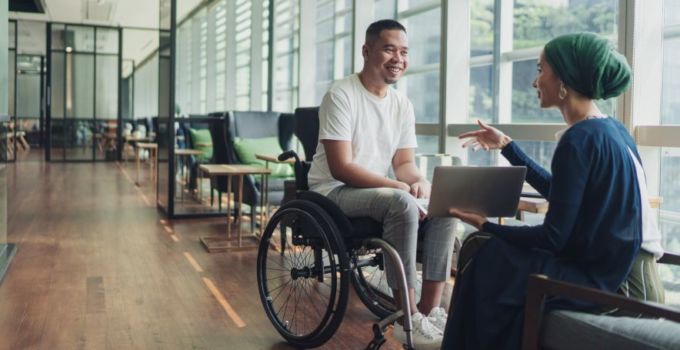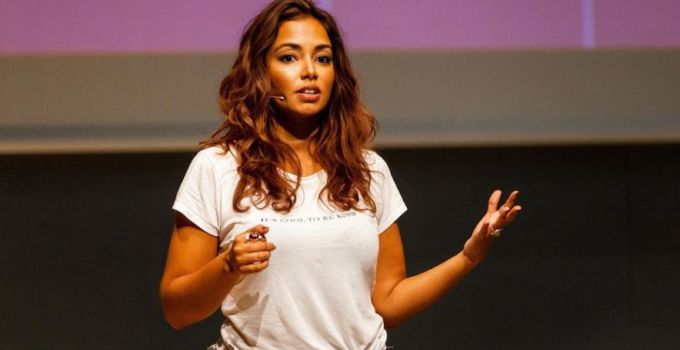Build accessibility and inclusion through disability awareness training
Organisations that focus on accessibility can attract a wider talent pool, helping to fill key roles and ensuring a more resilient workforce. Research shows that diverse and inclusive teams also bring a greater perspective that helps to drive creativity and innovation.
Our disability awareness training is designed to educate and inspire teams. It will equip you with the knowledge, language and legal understanding needed for building a disability-inclusive culture, policies and practices.
This essential training will benefit everyone in your organisation as well as contribute to business success.
Grow your talent pool
The Disability employment rate is only 53% compared to 81% in the general population
Neuro-inclusive support
59% of adjustments for neurodivergent employees are free, with the rest averaging £75 per person
Disability and Neurodiversity
Our disability awareness training also includes neurodiversity, which is covered by UK anti-discrimination law. The Equality Act 2010 defines someone as disabled if they:
- Have a physical or mental impairment, and
- The impairment has a substantial and long-term adverse effect on the person’s ability to carry out normal day-to-day activities.
Disability and neurodiversity are nuanced and complex topics covering a wide spectrum of experiences that can vary greatly. Each person’s experience of disabling barriers will differ – even those who share the same condition. Many people have more than one condition or difference or are also facing barriers related to other minoritised aspects of their identity.
Shifting perspectives, breaking barriers
Create a person-centred culture with disability awareness training
Disability is not a minority issue – 24% of the UK population is disabled and a further 15-20% are neurodivergent (DWP, 2024). So fostering an inclusive workplace is therefore essential for ensuring long-term organisational success and resilience.
Disability-inclusive design and practices should be embedded at all stages of an employee’s journey throughout the workplace. Many changes are simple and affordable, but where should you start?
Our disability awareness training outlines the barriers faced by Disabled individuals and intersects with our neurodiversity training, providing an integrated approach. Together, we explore the different models of disability, as well as concepts such as unconscious bias and how intersectionality forms an important element of inclusion.
This holistic perspective ensures your workplace is not only legally aware but also primed with practical ideas of how to improve disability inclusion at work.

Learning outcomes of our disability awareness training
Our comprehensive disability awareness training programme will help you to identify the barriers Disabled workers face and equip your team to overcome them. We will work together to ensure the learning content is flexible and tailored to meet your specific needs. Core content will include:
- Understanding the foundations of disability-inclusive best practice through the different models of disability and the legal requirements.
- Gaining an understanding of what disability and neurodiversity are, the barriers faced by Disabled individuals, and their impact.
- Exploring the evolution of the language around disability and neurodiversity.
- Understanding why a one-size-fits-all approach doesn’t work for disability inclusion due to the diversity of experience of Disabled people, and what ‘intersectionality’ means.
- Developing and utilising a person-centred way of working that is inclusive of Disabled and Neurodivergent employees, and benefits everyone.
What our clients say
The business case for disability awareness training
Training staff to be disability-aware is a worthwhile investment that offers multiple positive outcomes for an organisation, including:
- Connecting to a broader talent pool
- Increasing staff retention and loyalty
- Unlocking creativity and innovation
- Improving wellbeing
- Increasing productivity and collaboration
The EW Group offers expert disability awareness training programmes, where we can tailor learning content and formats to meet your organisation’s needs.
Disability awareness FAQs
What is disability awareness?
Disability awareness is about understanding and recognising the diverse experiences and barriers faced by Disabled people. It also acknowledges and celebrates their unique perspectives and contributions. This can involve challenging negative stereotypes, advocating for equal opportunities, creating disability-inclusive workplaces, and amplifying the voices of Disabled people to ensure their perspectives are heard and considered.
Why is it important to raise awareness about disability in the workplace?
Disability awareness in the workplace is crucial as it fosters a more inclusive and understanding environment for Disabled employees. When colleagues and supervisors are aware of the challenges and needs of Disabled individuals, it can lead to reduced stigma and discrimination, improved communication, and increased accessibility and support. All of this can significantly boost job satisfaction and improve the well-being and productivity of Disabled employees.
Furthermore, many countries have laws protecting the rights of Disabled people in the workplace. Raising awareness helps employers understand and comply with these regulations, avoiding potential legal issues.
What is the business case for disability awareness and inclusion?
Diverse teams, including those with Disabled people, bring a wealth of perspectives, experiences, and skills to the table, leading to increased innovation, creativity, and problem-solving abilities. This translates to better decision-making, improved products and services, and ultimately, increased profitability.
Companies that demonstrate a commitment to disability inclusion are often viewed favourably by customers, investors, and employees. Not only does this enhance brand reputation, but it also means the company is more likely to attract and retain top talent, particularly from the vast untapped talent pool of Disabled people.




